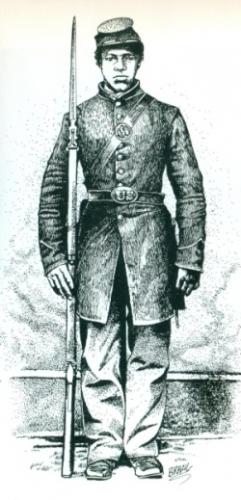Cathay Williams is the only documented African American woman who served as a soldier in the Regular U.S. Army in the nineteenth century. Cathay was born a slave around 1850 in Jackson County, Missouri. In September 1861 Union troops impressed Cathay into the Army to work as a cook and washerwoman for Union Army officers. She remained with the Army throughout the Civil War serving at various locales including Little Rock, Arkansas; New Orleans and Shreveport in Louisiana; and Savannah and Macon, both in Georgia. In 1864 she briefly served as cook and washerwoman for General Phil Sheridan and his staff in the Shenandoah Valley campaign.
On November 15, 1866 Williams disguised her gender and enlisted as William Cathey, serving in Company A of the 38th Infantry, a newly-formed all-black U.S. Army Regiment, one of its earliest recruits. Cathay said she joined the Army because “I wanted to make my own living and not be dependent on relations or friends.”
Cathay initially served at Jefferson Barracks outside St. Louis and was later posted at Fort Cummings and Fort Bayard in New Mexico Territory. Like other black soldiers stationed at remote western outposts after the Civil War, Cathay endured inadequate supplies and inferior weapons. One of the tallest privates in her company, Cathay concealed her femininity for two years despite numerous Army hospital visits before her true gender was discovered by the Fort Bayard post surgeon. Cathay was discharged at Fort Bayard on October 14, 1868 on a surgeon’s certificate of disability.
Following her discharge from the Army, Cathay resumed her identity as Cathay Williams and lived in Pueblo, Las Animas, and Trinidad, Colorado, where she was known as Kate. Cathay was hospitalized circa 1890 for over a year in Trinidad. In June 1891 Cathay filed a pension application based on medical disability incurred during military service as William Cathey. The Army rejected her pension claim on February 8, 1892, citing no grounds for a pensionable disability, but did not question her gender identity as William Cathay. The date of Cathay Williams’ death is unknown.

